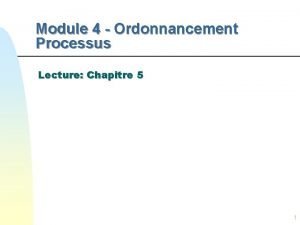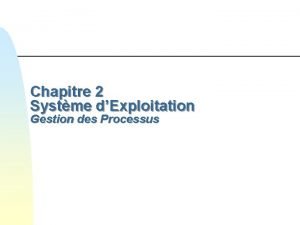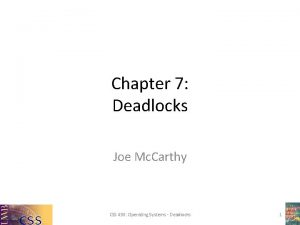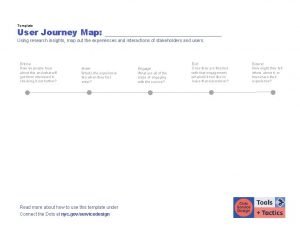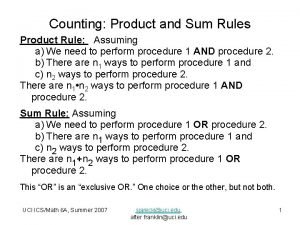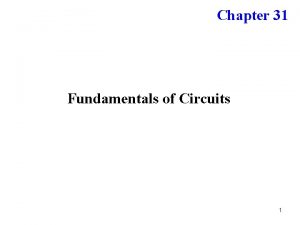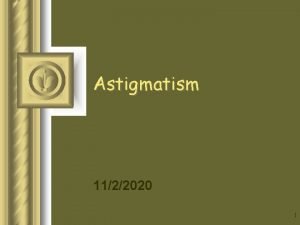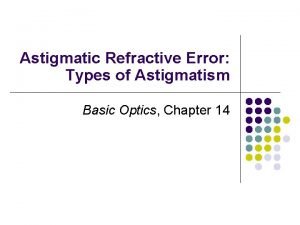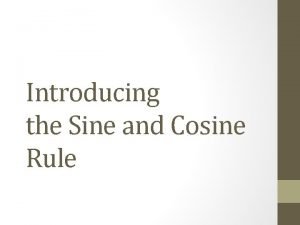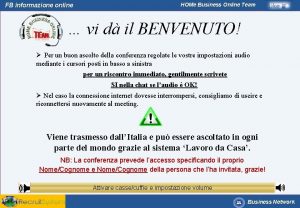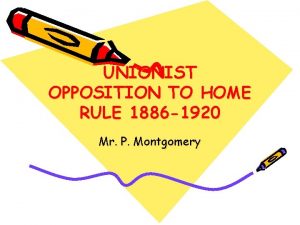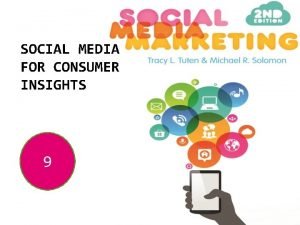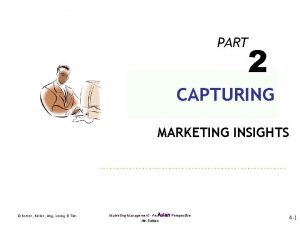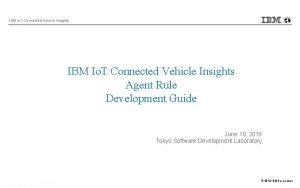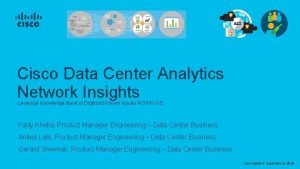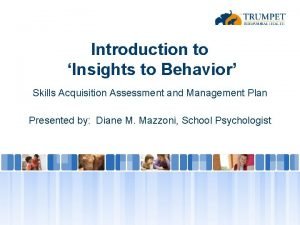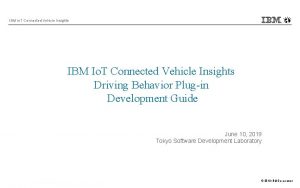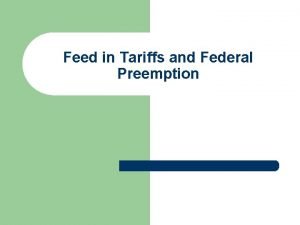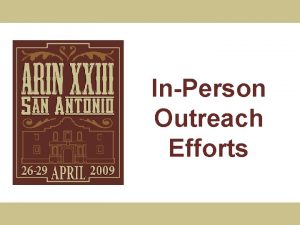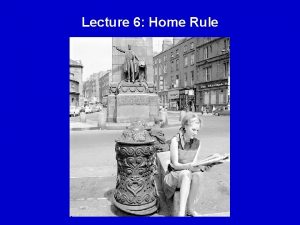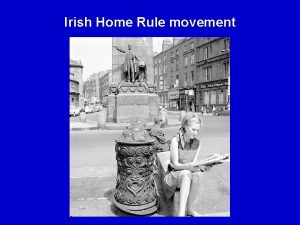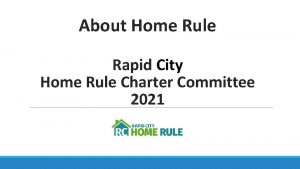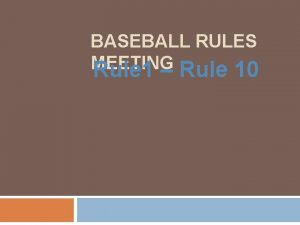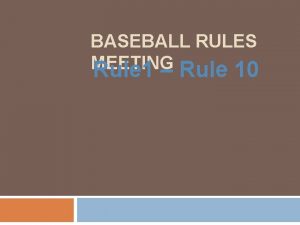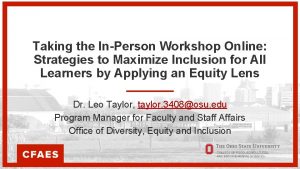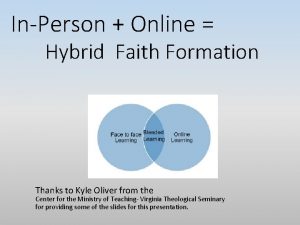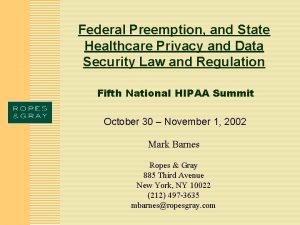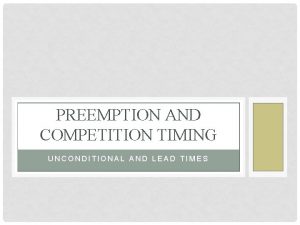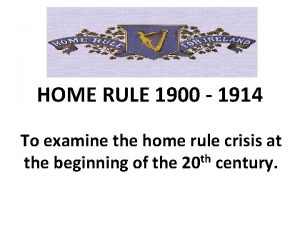PREEMPTION HOME RULE Insights from InPerson and Online



















































- Slides: 51

PREEMPTION + HOME RULE Insights from In-Person and Online Focus Groups with Voters July 17, 2019

Background. Working closely with the Local Solutions Support Center, Perry. Undem conducted six focus groups with voters in late May-early June 2019 to test messages about preemption and home rule. Then, taking the strongest messages from the focus groups, Perry. Undem conducted one online Remesh focus group with 107 voters in July 2019 to further test the messages and probe more on the issue of home rule. This report includes the results of both phases of research – the in-person focus groups and the online Remesh group. 2

1 st Phase: In-person Focus groups. − Six focus groups in three sites with varying experiences with preemption: Detroit (6/1), Orlando (5/31), and Phoenix (6/5). − In each site, one group was conducted with Democrats/Democratic-leaning Independent voters and another with Republican/Republican-leaning Independent voters. − All participants were engaged – they consume a lot of news and they take action locally. − Within each group, there was a mix of gender, age, race, and income. 3

2 nd Phase: Online Remesh Focus Group. − One online focus group of 107 likely voters across the US conducted July 1, 2019. − Conducted through the online platform Remesh – where each participant answers a question and then everyone’s response is rated by the other participants. This process gives outputs of ranked responses for each question during the discussion. − The participants were a mix of Democrats, Independents, and Republicans. − Within the group there was a mix of gender, age, race, and income. And, many participants were engaged voters who consume a lot of news and take action locally. 4

In-person Groups. Summary 5

In-person Focus Groups Key Takeaways – Preemption. − Preemption is not on the radar of these engaged voters. Only a handful are familiar with it. − After initial discussion, most lean against preemption in principle. They believe their local government should be able to have authority over many issues without state interference. − Why? State government is seen to be more influenced by special interests and money. Local government is perceived to be more in tune with the needs of local residents. − Preemption examples are helpful and make the issue real for voters. But examples can skew the discussion depending on the issue (e. g. , minimum wage, gun control). − But few voters know much about their local government or leaders. It is easy to seed doubt about their competence and intentions. − Voters of both parties do not like the punitive nature of some preemption – e. g. , taking money away from local government and lawsuits against local politicians. This seems petty, not about helping the residents of these communities to thrive. 6

In-person Focus Groups Key Takeaways – Preemption. − Voters can think of examples where preemption is a good thing. It helps to acknowledge this rather than push back. − It helped to point out there is a rise in state preemption laws. It makes some voters pause. Why is this happening? Some worry about a rise in authoritarianism and others blame special interests for this trend. − The top testing message is also the most matter-of-fact: it asserts that every community is different and needs the ability to develop their own policies to reflect the unique needs of the people living there. This wins across most of the groups. − Voters did not choose strong and partisan-sounding messages and language. They want a practical, neutral tone. To most, this is a pragmatic issue not an ideological one. − Drawing parallels to Jim Crow laws or pointing out the racial implications of state preemption only works for Democrats. Republicans reject this line of messaging. − ”State interference” is the best lay terminology across party ID to describe preemption. Those most concerned about preemption tended to like stronger terminology, however, such as “state overreach. ” 7

In-person Focus Groups Key Takeaways – Home Rule. − “Home rule” is even less familiar than preemption. − After defining it (“Home rule is a type of state law that affirms the power of local governments to regulate their own affairs and to govern in the best interests of their city”), most voters support it. They want their local government to have some degree of self rule. But they are not sure if home rule really changes anything. − When told the last home rule model was updated in 1953, they agree it should be updated. This is common sense. − They like most of the specific home rule updates we tested. Most controversial was: “Cities would have the authority to raise revenue and taxes. ” This splits voters and draws Republicans away. They don’t want more taxes. − Most respond positively to the paragraph we tested about the need to modernize home rule provisions. Their favorite phrases: ”voters are demanding practical problem solving” and that local governments are about “advancing the health and safety of their communities. ” − They end up generally supportive of efforts to strengthen home rule. They want their local government to have the authority to pass policies without state interference. 8

In-person Groups. Preemption 9

Voters start frustrated with partisanship and unclear about the relationship between state and local governments. These voters are frustrated with politics, politicians, and government. They see partisanship at all levels. They don’t see politicians coming together to solve problems. The closer the level of government, generally the less susceptible they believe they are to the problems they see with government. So, they start with the most trust in local government. But most have knowledge gaps about how local government works and most do not know their local leaders. Those in unincorporated cities or who live outside city limits are even more confused about their local government and leaders. Also, when it comes to different issues they care about, they are not sure who has more control between state and local governments. They assume state and local governments work well together most of the time. They are not aware of any current conflicts. Most did not know of any examples of preemption. 10

Many worry about the influence of special interests on state government. Most feel lobbying and money play more of a role in state government than in local affairs. Most voters see state government as far away and hard to impact. In Detroit, there was more distrust of local government due to past corruption. Still, even voters there tended to trust local leaders over state leaders. The big challenge is that even these engaged voters know little about how their local government works. Some have attended local city council meetings. A few could name their mayors. But most have not interacted with them. However, there was a sense they could figure out how to contact local officials – and have their voice heard – if they needed to. This reassures them. Their gaps in knowledge about local government means that it is easy to seed doubt about its competence. When one voter mentioned that his local city council member was recently arrested for a DUI, others began to question the qualifications and behavior of their local leaders. It is believable to many that unqualified people can win local elections. 11

Most are unfamiliar with preemption. A handful know the term and could name examples, but most could not. They are unfamiliar with preemption. We offered the following definition, which was not so helpful in clarifying the issue: “Preemption is a legal doctrine that mandates that a higher level of government may limit, or even eliminate, the power of a lower level of government to regulate a certain issue. For example, this means that the federal government can limit a state government’s ability to pass a certain law or tax. Or, a state government can limit a local government’s ability to pass a certain law or tax. ” In response, most do not initially know if preemption is a good or bad thing. It just sounds like how government functions. Insight: describing the process of preemption does not engage voters. They need to hear real life examples to form an opinion. 12

Examples are helpful but can bias the discussion. Preemption Examples We Shared in the Groups a. In Florida, individual elected officials, including former Tallahassee mayor Andrew Gillum, have been sued for their votes or speech defending local gun laws. And, now 30 mayors are part of a lawsuit challenging the punitive aspects of the state's gun preemption law. b. In Michigan, state managers were appointed to oversee the city of Flint through its water crisis and Detroit through its financial crisis, taking away control from local officials. c. In Arizona, the state legislature has said it will cut off state funds to any city that passes laws the state disagrees with. d. In Oklahoma, the state legislature has stopped local governments from passing environmental laws like city-wide plastic bag bans. e. In Wisconsin and Iowa, the state legislature prohibited local regulations of employee hours and overtime, employment benefits, paid leave, and other workplace standards. f. In Alabama, the legislature, which is over 80 percent white, stopped Birmingham, a city that is over 70 percent black, from raising its minimum wage from $7. 25 an hour. The examples resonated most with Democrat voters. Many immediately saw preemption as a bad thing. Republican voters were more troubled by the examples. They are conflicted about local government passing gun laws, paid leave policies, or raising the minimum wage. Perhaps the best example is “d” – Oklahoma preempting plastic bag bans. Many believe special interests are behind these preemptive laws and they don’t like that. Voters of both parties did not like the punitive examples we gave – “a” and “c. ” They do not think it is right that states take away funds or sue local politicians. These seems like blackmail and strong arm tactics. Many also believe there is another side to preemption – where state involvement could be a good thing. 13

Interest increases when we explain preemption is on the rise. Many feel they cannot make a judgment about preemption – that it’s a case by case issue. But when we tell them there has been an increase in states passing preemptive laws, they get interested. They wonder why? Some assume money and lobbyists are becoming more powerful in state government and see this as a bad trend. Some Democrats blame a rise in authoritarianism for the upswing while others think new people coming into local offices are pushing for more policies and innovation that state legislatures do not like. Others feel it must be that conservative state legislatures are trying to restrain overzealous local government from adding laws and requirements on local businesses. Some also feel that state interventions may be economicdriven… i. e. , they are preempting local laws because of potential impacts on the economy. Regardless, some see the rise in preemption as worrisome while others are not alarmed. But all want to learn more. 14

Snapshot: messages against preemption. Strongest to Weakest # of Times Chosen as Top Message Overall Ave. Rating 0 -10 Dems Reps B. Every community in a state is different… 12 19 8. 4 I. City councils and local governments know the values of their community… 5 15 8. 1 A. Government is most effective and accountable at the local level… 4 13 7. 9 C. Industry lobbyists have successfully pushed state lawmakers… 13 5 7. 5 E. States should pass laws that set minimum standards… 10 6 7. 5 F. State preemption efforts have been described as the next wave of Jim Crow policies… 10 3 5. 9 D. In the face of federal gridlock and state inaction, cities are on the front lines… 4 5 6. 9 H. Preemption efforts are designed to further discrimination… 4 1 5. 8 G. Preemption laws undermine the democracy of cities across the country. . 5 0 6. 6 15

Top message against preemption. . . “Every community in a state is different – from varying population sizes, to varying economic conditions, and varying demographics. All of those differences mean that the policies that may work best for one community just don’t make sense for another. And that’s why local government exists —to create laws that most accurately reflect the unique views, values and needs of the people who live there. ” Why it works: − Crosses party lines – both Democrats and Republicans rate it highly. − Least partisan of the messages. − “Every community is different” is strong language on this topic. − Explains the purpose of local government – which voters like to hear. − Pragmatic, common sense tone is just right – reflects how voters think about this issue. 16

Other strong messages. . . “City councils and local governments know the values of their community and what is best for the people who live there. These leaders are people we see every day at the grocery store, at school events, walking their dogs in our community and can best respond to the changing needs of the local area. ” “Government is most effective and accountable at the local level. Local officials are more in tune with the values and views of the people who live in their communities than state politicians. And, it allows cities to create policies that fit the unique needs of their communities. ” Why it works: − This is how they like to think of local government and leaders. − The last sentence is strong: “it allows cities to create policies that fit the unique needs of their communities. ” − They strongly believe local leaders have a high stake in passing helpful and effective local policies because they have to live there too. − They like the term “accountable” when talking about government. “Industry lobbyists have successfully pushed state lawmakers across the country to put their interests and profits ahead of allowing local governments to support healthy families, a clean environment, good jobs, local democracy, and safer communities. ” Why it works: − Most voters, regardless of party, perceive that state lawmakers are more susceptible to lobbying and money. − Likewise, they feel local government is less influenced by special interests. 17

One message only works with strong Democrats. . . “State preemption efforts have been described as the next wave of Jim Crow policies. Their effect is to keep wages and benefits low and deprive cities – where most people of color live – to act on the needs of their residents. And, they allow mainly white state lawmakers to impose their will on racially diverse cities. ” Why it works: − Strong Democrats are bothered by the idea of white state lawmakers passing preemptive state laws that hurt communities of color. − Being explicit about the impacts of preemption on communities of color is powerful for strong Democrats and voters of color. It turns off Republican voters. 18

Effective language that works against preemption… − Every community is different − Policies that work for one community just don’t make sense for another − States set laws that set minimum standards − (Preemption efforts) threaten the safety of the most vulnerable populations − Cities should be allowed to tailor and/or strengthen (state) floor setting laws − (Laws should) reflect the unique views, values, and needs of the people who live there − Reminding voters that local laws are about “improving the health and safety of local residents. ” − (Local leaders) are people we see every day at he grocery store, at school events, and walking their dogs… − It is effective to focus on special interest interference in local governance. This is their main worry about preemption – it is not so much that states are getting too involved, but lobbyists are interfering with their local policies. − (Lobbyists have pushed state lawmakers) to put their interests and profits ahead of allowing local governments to support healthy families… 19

Messages in favor of preemption. Strongest to Weakest Preemption efforts are necessary because… # of Times Chosen as Top Message They serve as a check on the dangerous policies passed by a small group of activist city council members 29 Local governments, if left unchecked, create an unworkable patchwork of regulations and policies throughout the state. 20 States function much better when they have uniform regulations and laws 14 Businesses find it too difficult to operate in states where the laws differ significantly from city to city. 10 Local policies violate the personal liberty and freedom of a city’s residents by imposing extreme laws without state oversight 7 Local government needs to be reined-in after too many examples of liberal local control and oppressive regulation. 5 Industries and businesses are overregulated. 2 It’s easy to seed doubt about the motives of local government since most know little about it. This is a vulnerability. It may help to keep reinforcing the purposes of local government… “to improve the health and safety of its residents. ” 20

Best terminology for preemption. . . # of Times Chosen as Best Dems Reps State interference 15 13 State overreach 9 9 Misuse of state power 7 6 Abuse of state power 8 5 State meddling 2 4 State intrusion 2 2 States stealing power 2 2 State authoritarianism (volunteered) 1 0 State conflict (volunteered) 1 0 State-local conflict (volunteered) 1 0 This term wins because it seems the most neutral and factual of all of the options. It works across party ID. 21

In-person Groups. Home Rule 22

They have never heard of home rule but generally support it after a definition. Hardly any of the voters have heard of home rule. Some could guess what it meant by the name, however. We offered the following definition, which helped: “Home rule” is a type of state law that affirms the power of local governments to regulate their own affairs and to govern in the best interests of their city. ” But we found that we had to add to the definition. We mentioned this was like a “city charter” that local governments could pass to lay out their approach to governing themselves. While they eventually understood the concept and vaguely supported it, they were unclear what it really meant and if it gave local government more authority or not. They liked hearing some of the history of home rule. It makes some more comfortable with the concept knowing it has been around a long time and is part of local governance. 23

Most agree home rule models and principles should be updated. “Home rule principles are outdated. The last home rule model was updated was 1953 and much has changed in 66 years. Cities are now drivers of state, national and global economies. And, two-thirds of Americans now live in cities and it’s where the most diverse populations of Americans live. So, the old rules which governed state-city relations no longer apply. ” Most feel it is common sense to update the home rule model to reflect modern day cities’ needs. But they are not very engaged in this issue – they are not sure this really matters. Cities seem to be running fine from their point of view without modern home rule principles. 24

They generally support the new home rule principles we tested but are conflicted about localities raising taxes. Potential New Home Rule Principles We Tested − States must clearly make their case for why they want to reduce local authority − States must assume local government has competence and capability − Cities would have the authority to raise revenue and taxes − States would be obligated to ensure local fiscal stability − Local governments would have immunity and protection from punitive preemption measures (like states withholding funds for cities) − States would need to reaffirm broad authority for local government and the local democratic process Most voters in the groups don’t know how to think about the potential new home rule laws we tested. Generally they supported them but they seemed abstract to voters. The moderator had to clarify these might be the kinds of things local governments might put in their charters. Also, without the context of knowing how local government typically operates, most assume these kinds of principles are already in place. The only controversial provision was the one that asserts cities would have the authority to raise revenue/taxes. Republicans in particular push back against this – they feel their local taxes are already too high and some complain they never see the benefits of these taxes. 25

Statement in favor of updating home rule provisions. “At this critical moment, the need to empower cities is clear: voters are demanding practical problem solving tailored to where they live, and they understand the benefits of local power —real policy flexibility, political accountability, and genuine diversity. Local democracy has always been important, but the authority of local governments cannot meet the challenges communities face today. Cities simply remain far too limited in what they can do to respond to local demands, from control over city policies, securing critically needed revenue, and advancing the health and safety of their communities. The time for an updated, vigorous vision of home rule has arrived. ” words/phrases voters liked words/phrases voters didn’t like 6. 9 Average score across all focus groups on a 0 (very negative) to 10 (very positive) scale The statement tended to work well with Democrats but less well with Republicans were generally more wary of home rule (and preemption) by the end of the focus groups. They still supported a strong local government in principle but had become suspicious of activist, liberal local governments pushing their agendas and raising taxes. This makes them cautious about home rule. Both sets of voters found some of the language too strong – ”demanding, ” “cannot meet challenges, ” “vigorous. ” They want this toned down. They want a pragmatic tone – home rule is not an ideological issue for them. 26

Where voters end up…. Five of the six in-person focus groups end up on your side when it comes to preemption and home rule. They feel local authority needs a boost – and they don’t like that preemption happens so often and is on the rise. The preemption messages and language tested in the focus groups resonate with most. What made a difference was talking about the recent increase in state preemptive laws – that got their attention. Also, when we focused on specific issues and examples, they were able to latch on to the topic. Only one group made up of more conservative Republicans ended up siding with states. After their initial assertion of trust in local government, they backed off and tended to think the state knew best and that when preemption happened, it was likely for a good reason. Perhaps if we had given specific examples as we did with preemption, voters might have been able to connect with the issue more. As the next step, we wanted to explore some of these themes more in an online Remesh focus group with voters… Home rule, on the other hand, remained somewhat theoretical for them and most voters never seemed to grasp how home rule would improve the lives of residents in their communities. Although supportive, there was less engagement in the topic. 27

Online Remesh Focus Group. Summary 28

Online Remesh Focus Group Key Takeaways – Preemption. − Voters in the online group trust their local governments more than their state government to address issues important to them. − After providing some basic information and examples on preemption, most thought it was a bad idea. − Voters say that preemption can reduce local control and make it easier for state government to abuse power. − Overturning local ballot results is especially unpopular, with most voters saying it is “very unacceptable. ” − Almost all think local governments should be able to pass laws that help “workers in their communities. ” And, most also think local government should be allowed to pass laws to help women, people of color, and LGBTQ individuals. − The process of overturning election results is seen as an abuse of power, ignoring the will of the people, and a way to undermine the point of voting. 29

Online Remesh Focus Group Key Takeaways – Preemption. − Many are frustrated at the increase in preemption as a result of increased lobbying efforts at the state level. They say this shows preemption is “all about the money. ” − Voters feel the best way to describe this influence is… “Special interest lobbyists have more influence over state legislators than I do. ” − Voters are most likely to say “local democracy” is at stake because of preemption. They see preemption efforts, especially overturning election results, as undermining democracy and preventing the voice of the people from being heard. 30

Online Remesh Focus Group Key Takeaways – Home Rule. − After a short description of home rule, most feel like it should be updated. They think that 66 years is a long time. − They see home rule as a good way of pushing back on preemption efforts and establishing more local control. − Most voters said the best way to describe the need for home rule is: “Home rule gives cities/local governments the power to act on the unique needs and values of their communities/residents, free from state interference. ” − ”Live Local, Decide Local” and “Our Home, Our Decisions” were the most popular ways of describing home rule. − Some are worried, however, about unchecked local governments that might use updated home rule to restrict certain rights or abuse their power. 31

Online Focus Group. Preemption 32

More voters trust city/local government than their state government to handle their area’s most pressing issues. Top comments… Who would you trust more to address issues that are most pressing? Order is from most trusted to least trusted… “I think local government has a better chance of fixing problems. ” “They know more about what is happening in our city. ” • Your city/local government • Both city and state government together “We need both city and state government on the same page. ” • Your state government “Local government knows the community. ” “Our local community is pretty good about actually doing what the voters want and need without crazy fighting or raising taxes to silly levels. ” 33

Most think preemption is a bad idea after hearing it described – many feel state government does not reflect their local values. The majority of the voters in the online focus group felt that preemption was a “bad idea” after hearing the information below… Here is some information about an issue that is happening in many states across the country – it’s often called “preemption”. Preemption is a legal doctrine that allows a higher level of government to limit, or even eliminate, the power of a lower level of government to regulate a certain issue. This is now being used increasingly by state legislators to limit a local government’s power to pass their own laws. . . Top reasons why preemption is a “bad idea”: “It creates much more power for a few people [on the state level], not a good idea. ” “Because our state government does not share the values of our local population due to gerrymandering. ” 34

Voters are particularly concerned about the impact of preemption on workers in their community – but most also care about how other key groups are impacted too. Almost all voters feel cities/local governments should be allowed to pass laws that help “workers in their communities. ” This is a powerful way to talk about who is at risk with preemption – workers in the community. But majorities also agree that women, people of color, and LQBTQ individuals have a lot at stake with preemption too. It is effective to talk about all of these groups when messaging about who is impacted by preemption. 35

Voters in the online group get mad when they read about using preemption to overturn local elections. They see this as taking away people’s rights. Most feel this is “unacceptable. ” Another issue around preemption is that some local ballot results in cities across the country have been overturned by state governments. Over the past few years, ballot results in at least seven cities on a variety of issues have been overturned by state legislatures including: a law preventing Uber from operating in Austin (Austin, TX); a law requiring businesses to offer paid sick days (Milwaukee, WI); and a law designed to support local hiring (Nashville, TN). In Tempe, AZ a local ballot measure requiring disclosure of campaign contributions in local races was overturned even though it passed with 91% support. Top reactions… “It destroys democracy! What is the point of voting. ” “Horrible. They are just taking away rights from people. ” “Too much power at state government doesn’t help local families and communities. ” “Horrible abuse of power. ” Please describe your reaction to preemption being used to overturn local ballot results? Please be as specific as possible. 36

Framing preemption around local decisions, local voices, is effective with voters in the online group. Voters reacted to the statement below about preemption. It was well received – they liked that it emphasizes the need for local voices to decide local issues. And, many feel that those who live in their communities know best. They read… We should have a voice in matters that impact us, our neighbors and our community. Our state is far too large and too diverse for politicians gathered in the state capitol to decree one-size-fits-all solutions for all our cities. We work local, we eat local, we live local – we should decide local. Top reactions… “It gives and preserves the local community’s voice. ” “There has to be room for local/city laws. ” “It allows locals to decide local issues. ” “Locals know best sometimes. ” 37

Voters are frustrated by the increase in state preemption and its connection to lobbying. Voters read… Over the years, there has been an uptick in preemption being used across the country to prevent or overturn city and local government policies. Some argue that this increase has happened because business and special interests have spent more money lobbying state legislators on issues important to them. For example, corporations have increased their number of lobbyists they use to ensure they are not regulated at the local level. Which do you think is the BEST way to describe the influence of people and organizations over state lawmakers and legislators? Order is from best response to weakest… • Special interest lobbyists have more influence over state legislators than I do. • State lawmakers are more likely to listen to corporate lobbyists than me. • State lawmakers care more about corporate profits than people. • State legislators make their decisions based on what large corporations want, not people. After reading this, voters are frustrated with what they see as corruption, money in politics, and that their voices do not matter. • State lawmakers are working for business lobbyists, not us. 38

At the end of the preemption discussion, voters feel “local democracy” is what’s at stake with preemption. Which of these is the BEST way to describe what’s at stake when states preempt local governments? Order is from best response to weakest… • Local democracy • Local control • Local autonomy • Local power • Local authority 39

Online Focus Group. Home Rule 40

After a brief description about the issue of home rule and an explanation that it has not been updated since 1953, most voters agree it needs an update. Voters read… Now, let’s talk about a topic that relates to the issue of preemption – something called “home rule. ” Home rule is a legal doctrine that gives cities and local governments authority over laws and policies in their communities. Some have argued that stronger “home rule” is an effective way of countering and pushing back on preemption efforts across the country. However, the last update of the “home rule doctrine” happened in 1953. Some argue that it is outdated – they say the role of cities has changed drastically over 66 years, and that local governments now need more control over their own laws, policies, and economy. 41

Which do you think is the best reason to update the “home rule” doctrine? Order is from best response to weakest… It is effective to point out that home rule needs an update in order to help cities solve today’s problems. • The last update of home rule was 66 years ago – and those rules are outdated now. Updating home rule would allow cities to solve today’s problems and reflect the values of the communities that live there now and in the future. • The last update of home rule was 66 years ago – and those were rules for a very different time. Today cities are on the frontlines, responsible for solving health and safety, economic, environmental, social problems. And 66 years ago states weren’t interfering in the decisions cities made. But they are interfering in a big way now. • America is becoming a much more diverse nation – and the diversity that’s found in cities now is our nation’s future. We need to do more to protect that diversity. • Two-thirds of Americans live in cities. Cities now need to meet the needs and reflect the values of a growing and diverse America. • 66 years ago, our economy was industrial; today it’s service-oriented. And those services are found in the cities. Cities were not the economic engine, the driver of a state’s economy then; they are now. 42

Talking about the unique needs and values of communities – free from state interference – is the best description for why home rule is needed. Which do you think is the best way to describe the need for “home rule”? Order is from best response to weakest… • Home rule gives cities/local governments the power to act on the unique needs and values of their communities/residents, free from state interference. • Home rule keeps control of my community in the hands of people like me and the local leaders we elect. • Home rule gives cities the power to make their own laws/to make their own decisions Top comments… “Keep local government local. ” “Sometimes local government knows best. ” “The power needs to be with the people. ” 43

Providing examples of home rule is helpful – it makes it clear what is at stake and why it matters. Voters read… Here are some examples of how “home rule” can be used to help cities: Top comments about home rule after hearing the examples… • A city decides to raise the minimum wage to $15 an hour “I support home rule. ” • A coastal community decides to ban plastic bags to protect their shore and wildlife “Home rule gives the cities the right to decide issues important to its citizens. ” • A city passes a law to prohibit Sunday brunch alcohol sales “Great for locals. ” • A city decides they can sell municipal property without an auction “Totally agree. ” • A city passes laws so they can take over blighted or rundown properties • A city is allowed to address traffic issues involving state roads “All for it. ” “I like it. ” “It gives great examples of why home rule is good. ” 44

It works to assert home rule is not partisan – but rather a way to solve local problems. Voters read… There is no Democratic or Republican way to fix a pothole, pick up garbage, respond to a 911 call or build parks for our children. Home rule is a constitutional power that ensures these services are provided locally, managed locally and decisions about their future are made locally – right here at home. Why it works: − References issues that are important to everyone, no matter their political affiliation − These are issues that are seen as best handled locally − Emphasizes that decisions will be managed by those who are closer to the communities 45

While support for home rule is strong, there are some concerns – some worry local governments could pass laws that “trample” people’s rights or abuse power in other ways. Top concerns about home rule… “A local government trampling individual rights. ” “That the people/city gets too much power. ” “Too many things being controlled and regulated. AKA, nanny state. ” “Some local governments might abuse it. ” “The city then has too much power. ” “In some cases it will not be beneficial if the state law regarding a particular issue is better. ” 46

“Live Local, Decide Local” and “Our Home, Our Decisions” are the best ways to describe home rule. What do you think is the best way of describing the issue of “home rule”? Order is from best to weakest… • Live Local, Decide Local • Our Home, Our Decisions • Our Hometown, Our Decisions • Unleash Local 47

Recommendations. 48

11 Recommendations 1. When messaging, reaffirm the purposes of local government. Remind voters that local government is working to improve the health and safety of the people living in their communities. This is what they are trying to protect. 2. Pit their local government against well-funded special interest groups. Don’t make state legislatures the bad guys – it is special interests and big money that are the problems. You can use the language that “special interest lobbyists have more influence over state legislators than you do. ” 3. Tell voters that state preemption laws are on the rise – and we need to do something about it. Explain that special interests are behind much of this increased energy behind preemption – not what is best for the residents of the community. 4. Back into preemption through an issue many people can agree on. Voters are not interested in preemption as a process – but are interested in how it plays out on issues they care about. State efforts to preempt plastic bag bans may be the most neutral example and also makes the issue real to voters. 5. Emphasize the role of local governments in helping workers. Almost all voters think local governments should be able to pass laws that help workers in their communities, but you can also talk about local government helping other key populations like women, people of color, and LGBTQ individuals. 6. Overturning local ballot results makes voters mad – so use this example. This is seen as an attack on democracy, and makes many feel as though local voices and votes are under threat. 49

11 Recommendations (cont’d) 7. An update to home rule seems a natural solution to preemption. Home rule is still a new issue and tough for some voters to understand. But, when explained in the larger context of preemption efforts, voters think an updated doctrine is a good response. 8. Use specific examples of home rule. Since home rule is not easily understood, it helps to provide specific examples of how home rule works in practice. And, the more local these examples seem, the better. 9. Focus on how nothing has happened in 66 years. Voters think it has been far too long since home rule was updated. They recognize that cities have changed drastically, so it makes sense that home rule must meet this new landscape. 10. Democrats and moderate Republicans are your audience. But depending on the specific issue, you may lose some of each group. Strong Republicans are not a good audience for this. 11. Use a pragmatic, common sense tone in messaging. Avoid strong, partisan, or emotional language. 50

51
 Preemption cs
Preemption cs Ordonnancement des processus
Ordonnancement des processus Sjf avec préemption
Sjf avec préemption Deadlocks mc
Deadlocks mc Dillon rule
Dillon rule Arti home care
Arti home care Perbedaan home care dan home visit
Perbedaan home care dan home visit New mobile home sales oak springs mobile home community
New mobile home sales oak springs mobile home community Unit 1 home sweet home
Unit 1 home sweet home Come home come home jesus is calling
Come home come home jesus is calling New mobile home sales oak springs mobile home community
New mobile home sales oak springs mobile home community Let's go to my house let's go today
Let's go to my house let's go today John heartfield
John heartfield She said that, home economics stands for the ideal home.
She said that, home economics stands for the ideal home. Home sweet home survive crash
Home sweet home survive crash Relie expense verification platform
Relie expense verification platform Marketing information and customer insights
Marketing information and customer insights Semi-tabular presentation
Semi-tabular presentation Insights and understanding ecclesiology
Insights and understanding ecclesiology Queensbridge map
Queensbridge map Relie responsible lending and insights engine
Relie responsible lending and insights engine Relie responsible lending and insights engine
Relie responsible lending and insights engine Relie responsible lending and insights engine
Relie responsible lending and insights engine Relie responsible lending and insights engine
Relie responsible lending and insights engine When to use sine rule and cosine rule
When to use sine rule and cosine rule Sine rule and cosine rule
Sine rule and cosine rule Kirchoff's junction rule
Kirchoff's junction rule Rule of sum and rule of product
Rule of sum and rule of product Kirchhoff loop rule
Kirchhoff loop rule What is with the rule and against the rule astigmatism
What is with the rule and against the rule astigmatism Simple astigmatism example
Simple astigmatism example Types of optics
Types of optics Sine and cosine rule
Sine and cosine rule Herbalife fb
Herbalife fb Irish home rule league
Irish home rule league Home rule 1886
Home rule 1886 Online design rule check
Online design rule check Data analytics quotes
Data analytics quotes Lauseenjäsennys tehtäviä
Lauseenjäsennys tehtäviä Social media consumer insights
Social media consumer insights Real insight
Real insight Forecasting and demand measurement in marketing
Forecasting and demand measurement in marketing Aruba ai insights
Aruba ai insights Ibm iot connected vehicle insights
Ibm iot connected vehicle insights Exploration insights portfolio
Exploration insights portfolio Article 5 the teacher and the profession
Article 5 the teacher and the profession Cisco network insights advisor
Cisco network insights advisor Family office insights
Family office insights Insights to behavior
Insights to behavior Corporate spirit
Corporate spirit Ibm iot connected vehicle insights
Ibm iot connected vehicle insights Insights on demand gpc
Insights on demand gpc

